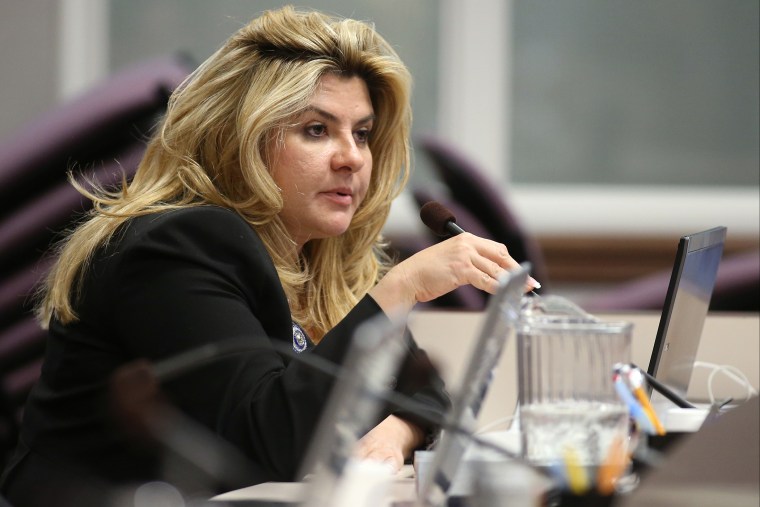A Nevada lawmaker is sponsoring a bill to legalize guns on college campuses in her state, a measure she said could prevent men from sexually assaulting "young, hot little girls."
Many gun rights advocates argue that arming female college students around the country would help reduce sexual assaults. One of those advocates, Republican Assemblywoman Michele Fiore of Nevada, said in a recent telephone interview with The New York Times: "If these young, hot little girls on campus have a firearm, I wonder how many men will want to assault them. The sexual assaults that are occurring would go down once these sexual predators get a bullet in their head."
RELATED: Florida House committee approves bill to allow guns at college
After publication of the Times report on Wednesday, Fiore issued a statement seemingly clarifying her remarks: "That may not be the most eloquent way to phrase it; however, I stand wholeheartedly by that sentiment because I want every citizen, whether they're on a college campus or not, to have the right to defend him or herself from sexual assault."
"So I ask: 'What's your point? Are you opposed to the right to self defense or are you arguing that rape is the new normal of attending college?'" she added.
Nevada law currently bans concealed weapons at colleges and universities, unless an individual gets permission from the institution's president, a rare occasion.
"If these young, hot little girls on campus have a firearm, I wonder how many men will want to assault them."'
The bill introduced by Fiore last Friday would change that, and also allow individuals with concealed weapon permits to carry their guns in public buildings and in unsecured areas of airports. Two previous attempts to pass the so-called "campus carry" bill, which was opposed by university officials, failed in both 2011 and 2013. But now that Republicans control both chambers of the Nevada state legislature, Fiore allegedly is confident her measure will become law.
Amanda Collins, who was unarmed when she was raped in a parking garage at the University of Nevada, Reno, in 2007, reportedly testified on behalf of the bill in 2013, saying she might not have stopped the attack but might have been able to defend herself.
Nine states currently allow guns on campuses, including Arkansas, Colorado, Idaho, Michigan, Mississippi, Oklahoma, Utah, Virginia, and Wisconsin. Besides Nevada, similar bills have been introduced in nine other states, including Florida and Texas. Republican state Rep. Greg Steube of Florida said a campus carry law would make colleges safer by allowing gun owners to intervene in shooting situations. Gun-free zones, he said, don’t prevent shootings from happening, citing the 2007 Virginia Tech massacre that killed 32 people and wounded 17. Steube introduced his bill just two months after a shooter injured three people at a Florida State University library in November.
Opponents of such laws view the legislation as another attempt by the gun industry to appeal to women and young people. Following the 2012 massacre at Sandy Hook Elementary School in Newtown, Connecticut, for example, the National Rifle Association made a push to close the gender gap in the firearms debate and court women by offering them bra holsters. (Just last month, a woman in Michigan reportedly accidentally shot herself to death while adjusting the revolver in her bra.) Proponents of guns in more places believe women need the weapons for self defense, and say they are concerned police won't arrive in time during an emergency situation.
But statistics show the presence of a gun in a domestic violence situation makes it five times more likely the woman will be killed. And in the United States, women are 11 times more likely to be murdered with a gun than women in other high-income countries, according to Everytown for Gun Safety. The presence of a gun in domestic violence situations increases the risk of homicide for women by 500%.
Shannon Watts, founder of Moms Demand Action for Gun Sense in America, called Fiore's statement "simply shameful." She said Fiore and other legislators with an "A" ranking from the NRA "are just doing the bidding of the gun lobby as they continue their push for more guns everywhere, no questions asked."
Surveys reveal the majority of students, university presidents, and police chiefs agree that more guns on campuses are not the answer to keeping women safe from sexual assault.
Students for Concealed Carry (SCC) is a national grassroots organization composed of more than 43,000 college students and their parents, as well as professors and faculty. Members believe holders of state-issued concealed handgun licenses should be able to carry their firearms on campuses. The group's website explains the members aren't affiliated with the NRA, but it appears the lobbying group has been involved in the push for more guns on campuses. The NRA, for example, frequently promotes SCC on its social media channels and in its publications, including on the news-talk show, "Cam & Co." The results of a Center for Public Integrity investigation into emerging SCC groups released last August note the NRA's central role in the push to allow campus carry in Florida and Idaho.
In December, "Cam & Co." host Cam Edwards spoke with the assistant director of public relations for SCC about the campus carry effort at the University of Wyoming, whose Faculty Senate had passed a resolution against concealed firearms on campuses.
"Our universities and colleges, they are supposed to be the last home of free and unfettered debate. So I would like to think the supporters of the Second Amendment do feel like they can speak out and speak up," Edwards said during the segment.
David Burnett, former SCC press director, in a 2012 op-ed in America's 1st Freedom called the campus revolt movement a "quiet revolution" that began "methodically rolling back these prohibitions, restoring freedom and self-defense to college campuses."
